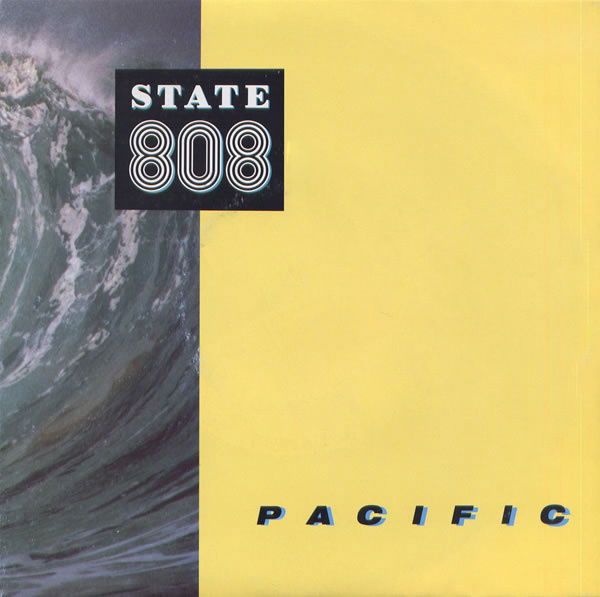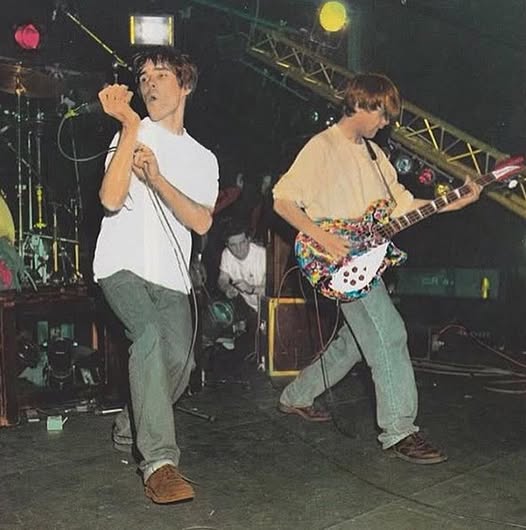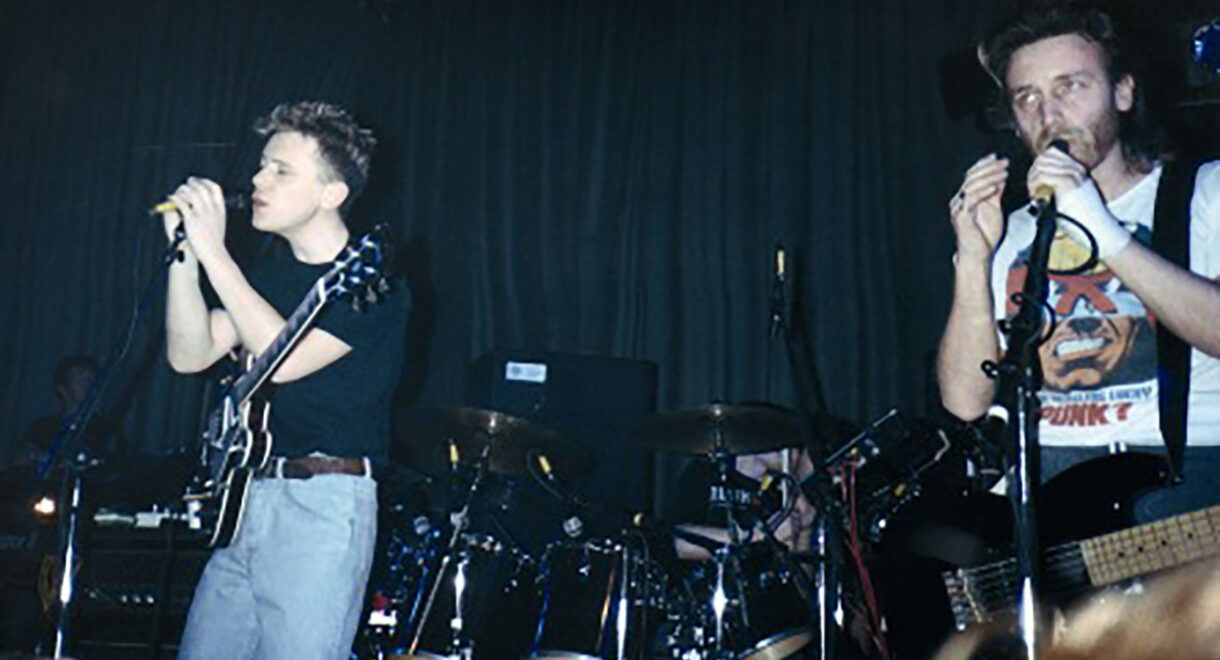Song Stories: 808 State: Pacific State
When it comes to the evolution of British electronic music, few tracks stand as tall as 'Pacific State' by 808 State. Released in 1989, this iconic tune not only marked the apex of acid house music but also became synonymous with the cultural transformation taking place in Manchester during the late '80s and early '90s.
The Hacienda nightclub, located in the heart of Manchester, was more than just a venue; it was a beacon for the burgeoning rave culture and the epicenter of the acid house movement. This nightclub, known for its eclectic mix of genres and notorious all-night parties, played a pivotal role in shaping the soundscape that would define a generation.
808 State, one of the most influential acts of the era, were at the forefront of this revolution. Comprised of Graham Massey, Gerald Simpson, and Martin Price, the group combined innovative drum machine programming with hypnotic synths to create a sound that captured the essence of the time: a thrilling, unrestrained escape into rhythm, bass, and melody.
'Pacific State', the track that would become their most well-known release, was the epitome of this style. Its smooth, swirling synths and laid-back groove were a far cry from the harder, faster beats that were dominating rave culture at the time. The track's mellow yet hypnotic flow made it an immediate classic, earning it a spot in clubs across the UK and beyond, including the infamous Hacienda. It captured the spirit of an era where music was about immersion and freedom, offering a soundtrack to a time of cultural exploration and nightlife escapism.
The creation of 'Pacific State' was as experimental as the track itself. Initially pieced together by Graham Massey and Gerald Simpson at Spirit Studios in Manchester, the early version emerged from a late-night jam session that blended analogue synths, saxophone samples, and sampled bird sounds recorded from a BBC effects album. Simpson’s love for jazz, combined with Massey’s studio know-how, helped birth the track’s distinctive, serene atmosphere.
Shortly after the track’s early recording, Gerald Simpson left the group to pursue a solo career under the name A Guy Called Gerald. It wasn’t long before he made his own mark on the scene with the release of 'Voodoo Ray' another landmark of UK acid house. With its quirky samples and hypnotic groove, 'Voodoo Ray' became a huge underground hit and cemented Simpson’s place in electronic music history.
Back in the 808 State camp, Graham Massey and Martin Price chose to re-record 'Pacific State' for wider release. The new version—retitled 'Pacific 202' retained the track’s tranquil core while polishing its structure and sound. Massey recorded a fresh saxophone part himself, lending the track a signature motif that set it apart in a landscape dominated by drum machines and synths.

Both versions of 'Pacific State' original and re-recorded captured a unique moment in time. They bridged the gap between dancefloor energy and ambient introspection, shaping the future of British electronic music and influencing countless producers. More than three decades on, 'Pacific State' remains not just a classic, but a sonic emblem of a cultural awakening
To truly understand the significance of 'Pacific State', it’s important to look at the environment in which it was born. The Hacienda, which opened its doors in 1982, became the focal point for the Manchester music scene, bringing together diverse crowds, genres, and personalities. It wasn’t just a nightclub; it was a cultural hub. The venue allowed for the kind of genre-blurring experimentation that led to the rise of acid house, an experimental subgenre of house music that was characterized by squelchy basslines, looping 303 synthesizers, and deeply hypnotic rhythms.
As a place where DJs like Mike Pickering and Graeme Park reigned supreme, the Hacienda was instrumental in turning Manchester into a global hub for electronic music. It was in these walls that the city’s acid house scene began to flourish, creating a unique blend of the raw energy of the rave movement with the emerging sounds of acid and techno. The club’s atmosphere of freedom and unity provided the perfect stage for tracks like 'Pacific State' to take hold, resonating with people who were looking for music that reflected their growing sense of hedonism and community.
808 State themselves were regulars at the Hacienda, and their music quickly became a staple on the club’s dancefloors. Their sound was fresh, experimental, and deeply tied to the spirit of the times. Pacific State wasn't just a song—it was a movement. Its release brought a new dimension to the acid house genre, merging elements of ambient music with the upbeat, bass-heavy rhythms that defined the genre. It was a track that appealed not only to the hardcore ravers but also to those looking for something more subtle and laid-back, yet still capable of getting the crowd moving.

The late 1980s and early 1990s were an era of profound cultural change in Manchester, and the music scene was at the heart of this revolution. The acid house movement wasn’t just about the rise of electronic music; it was also part of a broader shift in the city’s identity. Manchester had long been a city of industrial powerhouses, but by the late '80s, its cultural fabric was being rewoven by new ideas, sounds, and styles, driven by a generation of young people eager to break from the past.
This wave of creativity wasn’t limited to electronic music. Bands like The Stone Roses, Happy Mondays, and New Order were also helping to redefine the cultural landscape. These groups, alongside the electronic pioneers like 808 State, formed the backbone of what would come to be known as the "Madchester" scene, a term used to describe the vibrant, experimental, and free-spirited music scene that was emerging from the streets of the city.
The Stone Roses, formed in 1983, were the band that arguably kicked off the Madchester movement. Their self-titled debut album, released in 1989, became the soundtrack to a generation of young Mancunians looking for something that reflected their rebellious spirit. The Stone Roses fused indie rock with elements of psychedelia, funk, and dance music, creating a sound that was both accessible and adventurous. Tracks like ‘Fools Gold’ and ‘I Wanna Be Adored’ embodied the swagger and energy of the times, capturing the essence of a city ready to make its mark on the music world. The band’s presence at the Hacienda helped solidify its place as the heart of the Manchester music scene, influencing a whole new wave of bands and electronic artists alike.

Happy Mondays were another key player in the Madchester scene. Known for their unique blend of indie rock, funk, and dance, the band created music that reflected the heady, carefree atmosphere of the time. Their 1990 album Pills 'n' Thrills and Bellyaches is considered one of the defining records of the era, with tracks like ‘Step On’ and ‘Kinky Afro’ perfectly capturing the spirit of the burgeoning rave culture. The band, led by Shaun Ryder, was notorious for their wild antics and party-loving lifestyle, and their music was the perfect soundtrack for the acid house and clubbing scene. Happy Mondays’ chaotic energy and ability to merge rock with dance elements were mirrored in the experimental spirit of 808 State and other electronic acts, who were pushing the boundaries of what was possible in music.
New Order, formed after the demise of Joy Division in 1980, were another essential part of Manchester’s cultural revolution. As pioneers of synthpop and post-punk, New Order brought an electronic edge to rock music, influencing countless artists in the process. Their iconic track ‘Blue Monday’, released in 1983, is still one of the best-selling 12-inch singles of all time. New Order’s blend of guitar-based rock with electronic music made them a key influence on the acid house movement, bridging the gap between the raw energy of post-punk and the emerging dance music culture.
Not only did New Order shape the musical landscape of Manchester, but they also became directly involved in the cultural evolution of the city by owning and operating the Hacienda. In 1982, New Order along with their manager Rob Gretton and the influential Factory Records label purchased the Hacienda and transformed it into one of the most iconic nightclubs in music history. The club’s ethos was a perfect match for their experimental approach to music. By blending the emerging rave scene with the gritty, working-class atmosphere of Manchester, New Order and their associates ensured that the Hacienda was both a creative hub and a symbol of the city’s cultural resurgence. The club would go on to host legendary nights and witness the birth of Manchester's acid house movement, with artists like 808 State becoming synonymous with the venue’s wild, hedonistic parties.
As much as New Order’s ownership of the Hacienda helped define Manchester’s nightlife, their musical influence particularly the sound of Blue Monday was instrumental in shaping the electronic music landscape that would eventually pave the way for groups like 808 State. Both bands, in their respective genres, had a hand in laying the foundation for the UK’s dominant electronic music scene of the late '80s and early '90s.
Together, these bands formed the core of Manchester’s Madchester scene, which thrived in the late '80s and early '90s. The Hacienda served as the backdrop to this explosion of creativity, where electronic artists like 808 State, The Stone Roses, Happy Mondays, and New Order coexisted and influenced each other. The city, long associated with industrial strength, was now seen as a cultural powerhouse that was shaping the future of British music.

Noel Gallagher, the iconic frontman of Oasis, was a regular at the Hacienda during its heyday, deeply embedded in the pulse of the Manchester music scene. Though he would later become one of the most influential figures in British rock, Gallagher's early years were shaped by the vibrant electronic and indie movements that defined the city's cultural revolution. He frequently references the era's groundbreaking bands in interviews, showing how profoundly they influenced him.
Gallagher wasn’t just an onlooker; he was an active participant in the scene. He often crossed paths with 808 State members, particularly Graham Massey, who was known for his close ties to the community. In fact, Massey even used to deliver Gallagher’s giros (welfare checks), adding a personal touch to their connection. Gallagher fondly recalls 'Pacific State' and other acid house anthems as the soundtrack to his youth, forever tying these tracks to his formative years. In an interview with Mixmag, when reflecting on dance music and especially A Guy Called Gerald's 'Voodoo Ray,' Gallagher offered this nostalgic insight:
"Yeah, well, that (Voodoo Ray) and Pacific State by 808 State, they were the first two real great British classic acid house tunes that came out of Manchester. And Graham Massey, who was the main guy in 808 State, used to deliver my giros! I used to live on Whitworth Street in Manchester and I would see Gerald around all the time. Pacific State is fucking… what a piece of music! It's fucking far-out, man! Still to this day, it's one of the great fuckin’ acid house tunes, and the fact that they came from the streets I grew up in is mind-blowing."
'Pacific State' is just one of the brilliant songs that came out of Manchester at that time, but it's definitley one of the most important. It's one of the first British dance songs, it was the soundtrack of Madchester, but also became something bigger. Radio 1 would big up the song and it would begin to played on daytime radio. The song would chart eventually hitting the Top 10 in the UK